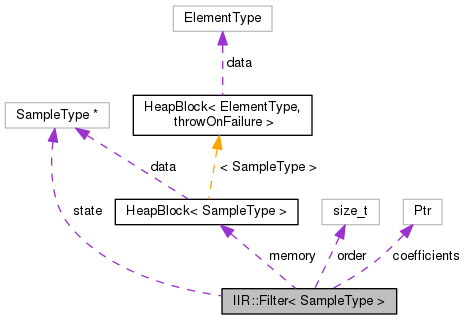A processing class that can perform IIR filtering on an audio signal, using the Transposed Direct Form II digital structure. More...
#include <juce_IIRFilter.h>

Public Types | |
| using | NumericType = typename SampleTypeHelpers::ElementType< SampleType >::Type |
| The NumericType is the underlying primitive type used by the SampleType (which could be either a primitive or vector) More... | |
Public Member Functions | |
| Filter () | |
| Creates a filter. More... | |
| Filter (Coefficients< NumericType > *coefficientsToUse) | |
| Creates a filter with a given set of coefficients. More... | |
| Filter (const Filter &)=default | |
| Creates a copy of another filter. More... | |
| Filter (Filter &&)=default | |
| Move constructor. More... | |
| void | prepare (const ProcessSpec &) noexcept |
| Called before processing starts. More... | |
| template<typename ProcessContext > | |
| void | process (const ProcessContext &context) noexcept |
| Processes as a block of samples. More... | |
| SampleType JUCE_VECTOR_CALLTYPE | processSample (SampleType sample) noexcept |
| Processes a single sample, without any locking. More... | |
| void | reset () |
| Resets the filter's processing pipeline, ready to start a new stream of data. More... | |
| void | reset (SampleType resetToValue) |
| Resets the filter's processing pipeline to a specific value. More... | |
Public Attributes | |
| Coefficients< NumericType >::Ptr | coefficients |
| The coefficients of the IIR filter. More... | |
Private Member Functions | |
| void | check () |
| void | snapToZero () noexcept |
Private Attributes | |
| HeapBlock< SampleType > | memory |
| size_t | order = 0 |
| SampleType * | state = nullptr |
A processing class that can perform IIR filtering on an audio signal, using the Transposed Direct Form II digital structure.
If you need a lowpass, bandpass or highpass filter with fast modulation of its cutoff frequency, you might use the class StateVariableFilter instead, which is designed to prevent artefacts at parameter changes, instead of the class Filter.
| using IIR::Filter< SampleType >::NumericType = typename SampleTypeHelpers::ElementType<SampleType>::Type |
The NumericType is the underlying primitive type used by the SampleType (which could be either a primitive or vector)
| IIR::Filter< SampleType >::Filter | ( | ) |
Creates a filter.
Initially the filter is inactive, so will have no effect on samples that you process with it. Use the setCoefficients() method to turn it into the type of filter needed.
| IIR::Filter< SampleType >::Filter | ( | Coefficients< NumericType > * | coefficientsToUse | ) |
Creates a filter with a given set of coefficients.
|
default |
Creates a copy of another filter.
|
default |
Move constructor.
|
private |
Referenced by IIR::Filter< SampleType >::reset().
|
noexcept |
Called before processing starts.
Referenced by IIR::Filter< SampleType >::reset().
|
noexcept |
Processes as a block of samples.
Referenced by IIR::Filter< SampleType >::reset().
|
noexcept |
Processes a single sample, without any locking.
Use this if you need processing of a single value.
Moreover, you might need the function snapToZero after a few calls to avoid potential denormalisation issues.
Referenced by IIR::Filter< SampleType >::reset().
|
inline |
Resets the filter's processing pipeline, ready to start a new stream of data.
Note that this clears the processing state, but the type of filter and its coefficients aren't changed.
References IIR::Filter< SampleType >::check(), JUCE_VECTOR_CALLTYPE, IIR::Filter< SampleType >::prepare(), IIR::Filter< SampleType >::process(), IIR::Filter< SampleType >::processSample(), IIR::Filter< SampleType >::reset(), and IIR::Filter< SampleType >::snapToZero().
Referenced by IIR::Filter< SampleType >::reset().
| void IIR::Filter< SampleType >::reset | ( | SampleType | resetToValue | ) |
Resets the filter's processing pipeline to a specific value.
See
|
privatenoexcept |
Referenced by IIR::Filter< SampleType >::reset().
| Coefficients<NumericType>::Ptr IIR::Filter< SampleType >::coefficients |
The coefficients of the IIR filter.
It's up to the called to ensure that these coefficients are modified in a thread-safe way.
If you change the order of the coefficients then you must call reset after modifying them.
Referenced by IIR::Coefficients< NumericType >::getRawCoefficients().
|
private |
|
private |
|
private |